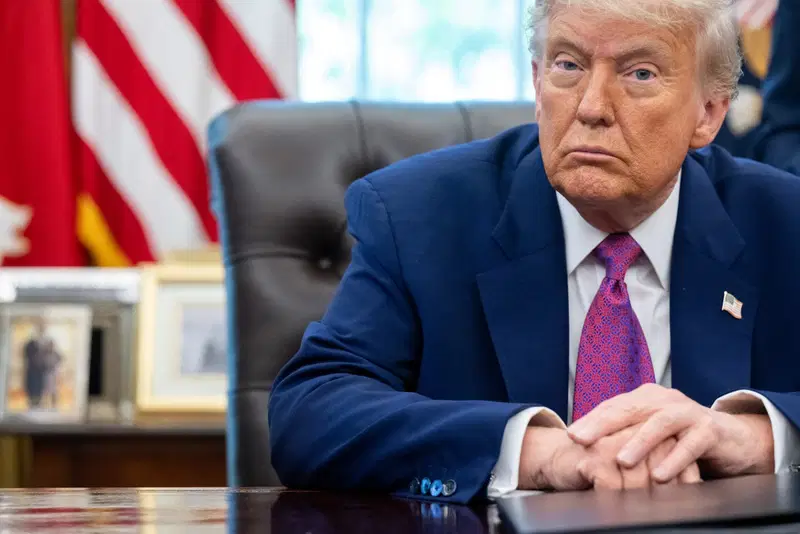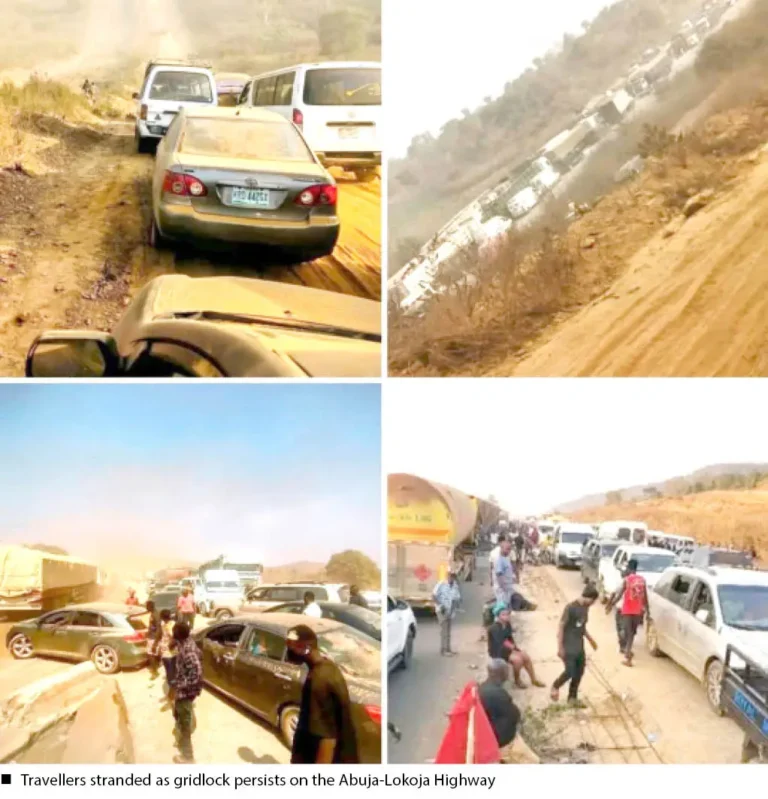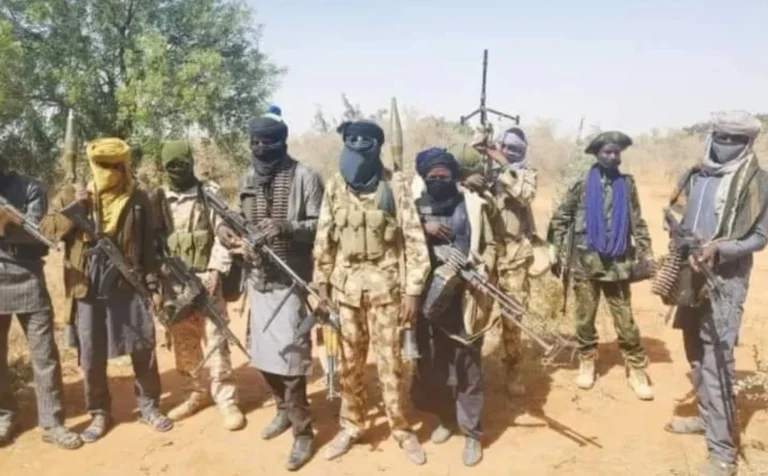
U.S. President Donald Trump has warned Tehran not to strike any U.S. targets just as he lauded Israel’s offensive.
He also denied Iranian allegations that the U.S. has taken part.
Trump, in a message on Truth Social, said: “If we are attacked in any way, shape or form by Iran, the full strength and might of the U.S. Armed Forces will come down on you at levels never seen before.
“However, we can easily get a deal done between Iran and Israel and end this bloody conflict.”
Trump had earlier said the U.S. had no role in Israel’s attack and warned Tehran not to widen its retaliation to include U.S. targets.
The U.S. military has helped shoot down Iranian missiles that were headed toward Israel, two U.S. officials said on Friday.
Trump has repeatedly said Iran could end the war by agreeing to tough restrictions on its nuclear programme, which Iran says is for peaceful purposes but Western countries say could be used to make a bomb.
The latest round of nuclear negotiations between Iran and the United States, due on Sunday, was scrapped after Tehran said it would not negotiate while under Israeli attack.
Trump sees peace between Iran and Israel soon
Despite evidence that the conflict between Israel and Iran is escalating, U.S. President Donald Trump expressed optimism on Sunday that peace would come soon and cited the possibility that Russia’s Vladimir Putin could help.
In a social media post, Trump said there were many unspecified meetings about the issue happening and encouraged the two countries to make a deal. And in an interview with ABC News, he said he was open to Putin, whose forces invaded Ukraine and who has resisted Trump’s attempts to broker a ceasefire with Kyiv, serving as a mediator.
“Iran and Israel should make a deal, and will make a deal,” Trump wrote on his Truth Social site. “We will have PEACE, soon, between Israel and Iran! Many calls and meetings now taking place.”
Trump did not offer any details about the meetings or evidence of progress toward peace. His assertion contradicted comments by Prime Minister Benjamin Netanyahu, who said on Saturday that Israel’s campaign against Iran would intensify.
A White House spokeswoman did not immediately respond to a request for comment on how Trump and the White House were working to de-escalate the situation in the Middle East.
Trump told ABC News that Iran wanted to make a deal and indicated something like the Israel strikes would accelerate that. “Something like this had to happen because I think even from both sides, but something like this had to happen. They want to talk, and they will be talking,” Trump said, according to ABC reporter Rachel Scott. “May have forced a deal to go quicker, actually.”
Meanwhile, the United States has engaged in talks with Iran about its nuclear programme and Trump has told reporters previously that the talks were going well. But another round of discussions scheduled for Sunday in Oman was canceled after the Israeli and Iranian strikes.
Trump said he and Putin had discussed the situation in the Middle East on Saturday in a call that focused more on that conflict than the Russian war in Ukraine.
Trump vetoes plan to target Khamenei, US officials say
Two U.S. officials told Reuters that President Donald Trump had vetoed an Israeli plan in recent days to kill Iran’s Supreme Leader Ayatollah Ali Khamenei.
Have the Iranians killed an American yet? No. Until they do we’re not even talking about going after the political leadership,” said one of the sources, a senior U.S. administration official.
As Israel and Iran launched fresh attacks on each other, on Sunday, killing scores of civilians and raising fears of a wider conflict, rescue teams in Israel combed through rubble of residential buildings destroyed by Iranian missiles, using sniffer dogs and heavy excavators to look for survivors after at least 10 people, including children, were killed, raising the two-day toll to 13.
Sirens rang out across the country after 4 p.m. on Sunday in the first such daylight alert, and fresh explosions could be heard in Tel Aviv.
In Iran, images from the capital showed the night sky lit up by a huge blaze at a fuel depot after Israel began strikes against Iran’s oil and gas sector – raising the stakes for the global economy and the functioning of the Iranian state.
Iran has not given a full death toll but said 78 people were killed on Friday and scores more have died since, including in a single attack that killed 60 on Saturday, half of them children, in a 14-storey apartment block flattened in Tehran.
Trump said the conflict – which has raised fears of a wider conflagration – could be ended easily, while also warning Iran that the U.S. could get involved if Iran hits any American targets.
Netanyahu denies plan to kill Khamenei
When asked about the Reuters report on a plan to kill Khamenei, Israeli Prime Minister Benjamin Netanyahu told Fox News said: “There’s so many false reports of conversations that never happened, and I’m not going to get into that.”
“We do what we need to do,” he told Fox’s “Special Report with Bret Baier.”
Regime change in Iran could be a result of Israel’s military attacks on the country, Netanyahu said, adding that Israel would do whatever is necessary to remove what he called the “existential threat” posed by Tehran.
Israel’s military spokesperson has said the current goal of the campaign is not regime change, but the dismantling of Iran’s nuclear and ballistic missile programs and removing its capabilities “to annihilate us”.
Netanyahu says regime change in Iran could be result of Israel’s attacks
Regime change in Iran could be a result of Israel’s military attacks on the country, Israeli Prime Minister Benjamin Netanyahu told Fox News on Sunday.
He said Israel would do whatever is necessary to remove the “existential threat” posed by Tehran.
Israel launched ‘Operation Rising Lion’ with a surprise attack, on Friday morning, that wiped out the top echelon of Iran’s military command and damaged its nuclear sites, and says the campaign will continue to escalate in coming days.
Iran has vowed to “open the gates of hell” in retaliation.
Israel’s military has said the current goal of the campaign is not a change in regime, but the dismantling of Iran’s nuclear and ballistic missile programmes.
Asked by Fox’s Bret Baier on his “Special Report” programme if regime change was part of Israel’s military effort, Netanyahu said: “Could certainly be the result because the Iran regime is very weak.”
“We’re geared to do whatever is necessary to achieve our dual aim, to remove … two existential threats – the nuclear threat and the ballistic missile threat,” Netanyahu said in one of his first interviews since Israel’s attacks began.
“We did act – to save ourselves, but also, I think, to not only protect ourselves, but protect the world from this incendiary regime. We can’t have the world’s most dangerous regime have the world’s most dangerous weapons,” he said.
Israel has said its operation could last weeks, and Netanyahu has openly urged the Iranian people to rise up against their Islamic clerical rulers.
Asked about a Reuters report that Trump vetoed an Israeli plan to kill Iran’s Supreme Leader Ayatollah Ali Khamenei, Netanyahu said: “I’m not going to get into that.”
But he said he had informed Trump ahead of Friday’s military action. American pilots are shooting down Iranian drones headed toward Israel, he said.
With worries growing of a regional conflagration, Trump has lauded Israel’s offensive while denying Iranian allegations that the U.S. has taken part in it. He warned Tehran not to widen its retaliation to include U.S. targets or else face the “full strength and might” of the U.S. armed forces.
Israel’s El Al cancels all flights till June 19
Israel’s El Al Airlines (ELAL.TA), opens new tab announced on Sunday that it has suspended all flights until at least June 19, with additional cancellations to many European cities extending to June 23, due to the ongoing conflict between Israel and Iran.
The Israeli flag carrier had earlier suspended all flights until June 17, with Israel’s airspace still closed.
“Once approvals are received from the relevant security and aviation authorities, we will do everything possible to allow as many Israelis as possible to return home, gradually resume our regular flight schedule and operate rescue flights from destinations near Israel,” El Al said.
Israel’s National Security Council, NSC, cautioned against travel to Israel through Egypt and Jordan despite their borders being open.
“We would like to emphasize that both Sinai (in Egypt) and Jordan are under Level 4 travel warnings – indicating a high threat level – and we recommend avoiding travel to these areas. These warnings are especially relevant during this time of heightened tension,” the NSC said.
“For Israelis currently abroad and waiting to return to the country, we recommend waiting for updates on the matter from the Ministry of Transportation.”
Civilians urged to evacuate target areas
Israel and Iran launched fresh attacks on Sunday, killing and wounding civilians and raising concerns of a broader regional conflict, with both militaries urging civilians on the opposing side to take precautions against further strikes.
German Chancellor, Friedrich Merz, said he hoped a meeting of the Group of Seven leaders convening in Canada on Sunday would reach an agreement to help resolve the conflict and keep it from escalating.
The Israeli military, which launched the attacks on Friday with the stated aim of wiping out Iran’s nuclear and ballistic missile programs, warned Iranians living near weapons facilities to evacuate.
“Iran will pay a heavy price for the murder of civilians, women and children,” Israeli Prime Minister Benjamin Netanyahu said from a balcony overlooking blown-out apartments where six people were killed in Bat Yam, a town south of Tel Aviv.
Iran’s armed forces told residents of Israel to leave the vicinity of “vital areas” for their safety.
“Do not stay or travel near these critical areas,” an Iranian armed forces spokesperson said in a video broadcast by state TV around the time that Iran sent a new barrage of missiles towards Israel.
Death toll rises
In Israel, rescue teams combed through rubble of residential buildings destroyed by Iranian missiles, using sniffer dogs and heavy excavators to look for survivors after at least 10 people, including children, were killed, raising the two-day toll to 13.
Explosions rattled Tel Aviv in the afternoon as Iran launched its first daylight missile raid since Israel attacked on Friday. There were no immediate reports of direct hits in the initial barrage.
Hours later, shortly after nightfall, Iran launched a second wave of missiles, which struck Haifa, a mixed Jewish-Arab city in northern Israel.
An Israeli military official said that an elderly care facility was hit.
The national emergency service reported 9 people were injured in the strike, along with 2 others following a missile impact in southern Israel.
In Bat Yam, on Sunday evening, shocked residents gathered to survey the damage, while many across Israel braced for another sleepless night, unsure of what may come next.
“It’s very dreadful. It’s not fun. People are losing their lives and their homes,” said Shem, 29, whose home was shaken overnight when a missile struck a nearby apartment tower.
In Iran, images from the capital showed the night sky lit up by a huge blaze at a fuel depot after Israel began strikes against Iran’s oil and gas sector – raising the stakes for the global economy and the functioning of the Iranian state.
Iran has not given a full death toll but said 78 people were killed on Friday and scores more have died since, including in a single attack that killed 60 on Saturday, half of them children, in a 14-storey apartment block flattened in Tehran.
VANGUARD.




